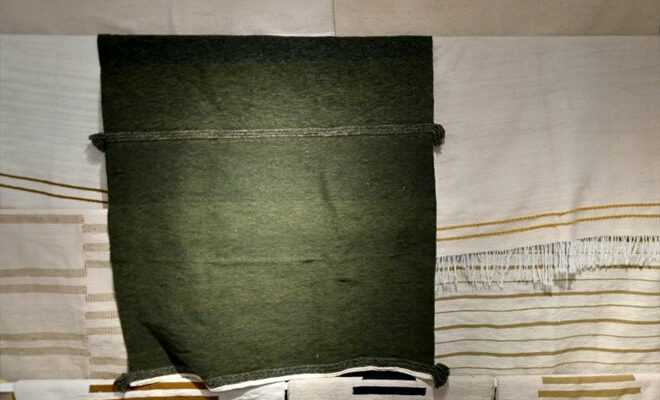Najet, a 52-year-old Tunisian, in a second-hand clothes recycling workshop in Nefta, in the south-west of the country, on February 12, 2022 (AFP/FETHI BELAID)
Najet frays jeans that will soon be a designer rug: the traditional, ecological know-how before its time, of Tunisian mothers consisting in recycling second-hand clothes, is at the heart of a social and solidarity project that has spread throughout the country.
“I learned to weave very young with my mother, duvets or kashabiyas (jellabas)”, tells AFP Najet, 52 years old. Today, she devotes herself to kilims: “I make a good living and I work at home”.
It was his nephew, Mehdi Baccouche, a 33-year-old Franco-Tunisian, who had the idea in 2014 of ordering rugs from him for friends. From a simple page on Facebook (“El Mensej”, the loom), the project has grown, giving birth in 2016 to the Shanti association, which buys carpets in advance and takes care of resale.
Today, he supports or brings an income to 12 artisans in the poor oasis of Nefta, 500 km south of Tunis.
By inserting the wool into the weft, Najet shows the patterns with pride: “it comes out of my imagination, I prepared lines of colors and they (Shanti) accepted them”.
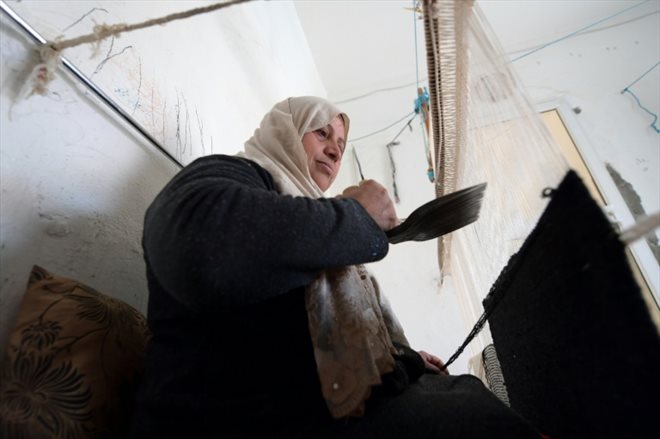
Najet, a 52-year-old Tunisian, in a second-hand clothes recycling workshop in Nefta, in the south-west of the country, on February 12, 2022 (AFP/FETHI BELAID)
The old hats or socks that serve as raw material for a beautiful black, beige and gold carpet, come from second-hand clothes from the local market.
Shanti has also opened a haberdashery in Nefta where craftswomen get free supplies of multicolored balls, from second-hand or unsold industrial clothing. No risk of shortage: the Tunisian textile sector has 1,600 manufacturers, subcontractors of European brands.
– A different look –
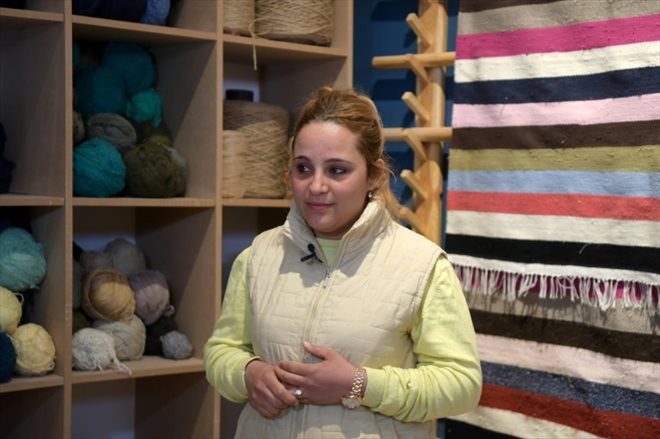
Fatima Alhamal, coordinator of the Shanti association in Nefta, in southwestern Tunisia, on February 12, 2022 (AFP/FETHI BELAID)
According to Fatima Alhamal, 25, guide for Shanti in Nefta, haberdashery “makes a huge difference”: before, “craftswomen had to find and pay for all the raw material, earning 40 or 50 dinars (12 to 15 euros) with a kilim “.
Each standard carpet (1.80 m by 2) now earns them 120 dinars.
The association also improves their workspace, for example by installing air conditioning in this torrid region in summer.
Thanks to their activity, these women also see their social role revalued: “people look at them differently” and training with designers gives them an opening to the outside, according to Fatima.
At first, Mr. Baccouche was mocked: “this popular art” of recycling second-hand clothes was described as “work of old ladies”.
“It was important to demonstrate that you can be a lady who has not studied, does not know how to use the internet, but who can have an activity and make a living from it”, he underlines, recalling the weak employment rate of women in the south.
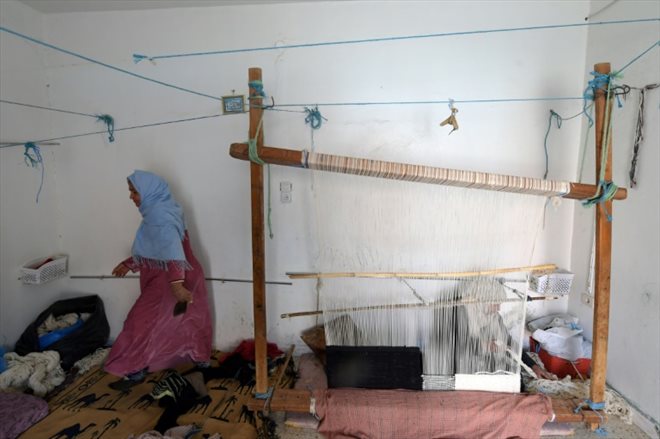
A weaving loom and an employee of the Shanti association in Nefta, in the south-west of Tunisia, on February 12, 2022 (AFP/FETHI BELAID)
The association orders a maximum of four carpets per month per woman to avoid any overload, and ensures that the work “is not too upsetting for the family balance”.
The carpet money is not paid in cash but into postal accounts in their name. To prevent their husbands from charging them with “paying for shopping, electricity or schooling for the children”, according to Mr. Baccouche.
– “Up to date” –
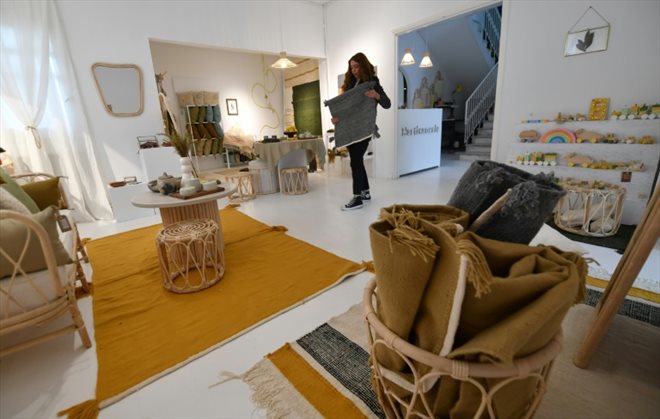
Rugs sewn from second-hand clothes by the Nefta association in Tunis, April 15, 2022 (AFP/FETHI BELAID)
By capitalizing on “these learnings made along the way”, Shanti applied its pre-purchase system to other handicraft products, offered in a solidarity shop in Tunis: “L’Artisanerie”.
This space also accommodates creators and coordinators, who increasingly support craftsmen from other regions such as Ain Draham (west) for rattan furniture, Tabarka (north) for pottery or Mahdia (east) for embroidery. .
In four years, 200 artisans have found outlets for their creations and 60 work daily for L’Artisanerie.
“We try to show that we can make 100% Tunisian, with Tunisian raw materials and know-how, but a design adapted to the taste of the day”, underlines Mr. Baccouche.
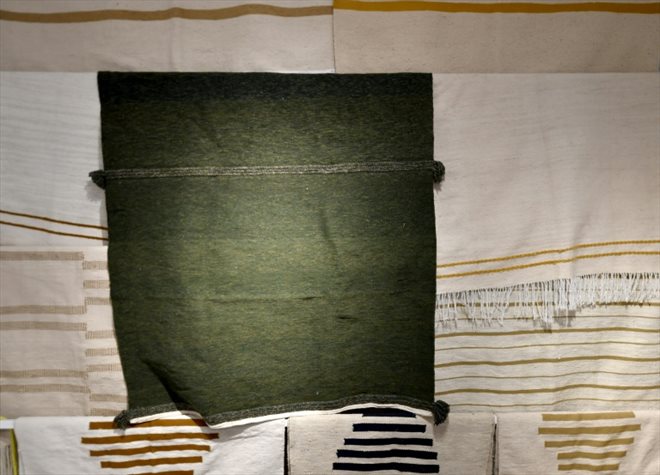
Rugs sewn from second-hand clothes by the Nefta association in Tunis, April 15, 2022 (AFP/FETHI BELAID)
The items “co-created” by Shanti with the craftsmen are sold to “Tunisian decorating enthusiasts” or shipped abroad. Institutions and companies also place large orders (164 recycled denim carpets last year for Indigo, supplier of Mango or Zara).
“We are trying to put in place a whole eco-responsible production and logistics chain,” explains Mr. Baccouche.
For the moment, the sales do not cover the charges, hence the need for Shanti to be helped by partners such as Oxfam or Denmark. Especially since the incubator has just extended its projects to sustainable agriculture and ecotourism.
© 2022 AFP
Did you like this article ? Share it with your friends with the buttons below.


